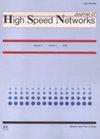Oblivious stable sorting protocol and oblivious binary search protocol for secure multi-party computation
IF 1
Q4 COMPUTER SCIENCE, INFORMATION SYSTEMS
引用次数: 2
Abstract
Multi-party computation (MPC) sorting and searching protocols are frequently used in different databases with varied applications, as in cooperative intrusion detection systems, private computation of set intersection and oblivious RAM. Ivan Damgard et al. have proposed two techniques i.e., bit-decomposition protocol and bit-wise less than protocol for MPC. These two protocols are used as building blocks and have proposed two oblivious MPC protocols. The proposed protocols are based on data-dependent algorithms such as insertion sort and binary search. The proposed multi-party sorting protocol takes the shares of the elements as input and outputs the shares of the elements in sorted order. The proposed protocol exhibits O ( 1 ) constant round complexity and O ( n log n ) communication complexity. The proposed multi-party binary search protocol takes two inputs. One is the shares of the elements in sorted order and the other one is the shares of the element to be searched. If the position of the search element exists, the protocol returns the corresponding shares, otherwise it returns shares of zero. The proposed multi-party binary search protocol exhibits O ( 1 ) round complexity and O ( n log n ) communication complexity. The proposed multi-party sorting protocol works better than the existing quicksort protocol when the input is in almost sorted order. The proposed multi-party searching protocol gives almost the same results, when compared to the general binary search algorithm.安全多方计算的遗忘稳定排序协议和遗忘二进制搜索协议
多方计算(MPC)排序和搜索协议经常用于不同的数据库和不同的应用,如协作入侵检测系统、集合交集的私有计算和遗忘内存。Ivan Damgard等人提出了两种技术,即MPC的位分解协议和位小于协议。将这两个协议作为构建块,提出了两个无关的MPC协议。所提出的协议是基于数据相关的算法,如插入排序和二分搜索。提出的多方排序协议以元素的份额作为输入,并按排序顺序输出元素的份额。该协议具有O(1)恒定轮复杂度和O (n log n)通信复杂度。提出的多方二进制搜索协议需要两个输入。一个是按顺序排列的元素的份额,另一个是要搜索的元素的份额。如果搜索元素的位置存在,协议返回相应的份额,否则返回零份额。所提出的多方二进制搜索协议具有O(1)轮复杂度和O (n log n)通信复杂度。在输入几乎有序的情况下,所提出的多方排序协议比现有的快速排序协议效果更好。与一般的二进制搜索算法相比,所提出的多方搜索协议给出了几乎相同的结果。
本文章由计算机程序翻译,如有差异,请以英文原文为准。
求助全文
约1分钟内获得全文
求助全文
来源期刊

Journal of High Speed Networks
Computer Science-Computer Networks and Communications
CiteScore
1.80
自引率
11.10%
发文量
26
期刊介绍:
The Journal of High Speed Networks is an international archival journal, active since 1992, providing a publication vehicle for covering a large number of topics of interest in the high performance networking and communication area. Its audience includes researchers, managers as well as network designers and operators. The main goal will be to provide timely dissemination of information and scientific knowledge.
The journal will publish contributed papers on novel research, survey and position papers on topics of current interest, technical notes, and short communications to report progress on long-term projects. Submissions to the Journal will be refereed consistently with the review process of leading technical journals, based on originality, significance, quality, and clarity.
The journal will publish papers on a number of topics ranging from design to practical experiences with operational high performance/speed networks.
 求助内容:
求助内容: 应助结果提醒方式:
应助结果提醒方式:


